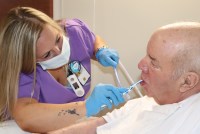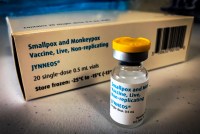Latest KFF Health News Stories
Kids Want to Put Montana on Trial for Unhealthy Climate Policies
Sixteen children and young adults are suing the state over energy policies they say are hurting their health and environment. The flooding that closed Yellowstone National Park may show they have a point.
‘American Diagnosis’: A Tribal Court in California Works to Heal Family Separation
Indigenous people in the United States face disproportionately high rates of incarceration and family separation through the foster care system. Episode 8 explores the Yurok Tribal Court’s efforts to keep families together.
Tres cosas que hay que saber sobre la cobertura del seguro para abortos
Apenas una de las decenas de conflictos: el aborto puede estar cubierto por un plan de salud, pero si no hay proveedores disponibles, las pacientes no tienen acceso.
Three Things to Know About Insurance Coverage for Abortion
Even before the Supreme Court struck down the constitutional right to abortion, insurance coverage for the service varied widely. Now it’s become even more complex, with additional changes and court challenges to come.
Patients With Epilepsy Navigate Murky Unregulated CBD Industry
The FDA has approved a cannabis-derived drug, Epidiolex, to treat some forms of epilepsy. Now people who have other forms of the condition are using over-the-counter CBD products in hopes of taming their seizures. But doctors and patients worry about the unregulated world of CBD, in which product ingredients can be a mystery.
La neumonía adquirida en el hospital está matando pacientes. Aunque es fácil de prevenir
Esta forma de neumonía generalmente se desarrolla cuando bacterias en los dientes “viajan” a los pulmones. Por eso la higiene bucal es esencial en los hospitales.
‘An Arm and a Leg’: One ER Doctor Grapples With the Inequities of American Health Care
This episode is an interview with Dr. Thomas Fisher, author of “The Emergency: A Year of Healing and Heartbreak in a Chicago ER.”
As California Welcomes Ukrainian Refugees, Counties Fall Short on Interpreters
As Ukrainians settle in California, many are tapping Medi-Cal. But in some counties, particularly Sacramento, the health department doesn’t have enough interpreters.
Self-Managed Abortions Gain Attention, but Helpers Risk Legal Trouble
A network of organizations help women use medication to end early pregnancies safely. But it’s a legal gray area in Tennessee and other states that restrict abortion.
Hospital-Acquired Pneumonia Is Killing Patients. Yet There Is a Simple Way to Stop It.
Hospital-acquired pneumonia not tied to ventilators is one of the most common infections that strike within health care facilities. But few hospitals take steps to prevent it, which can be as simple as dutifully brushing patients’ teeth.
Las medidas de Colorado no sirven para frenar los altos niveles de ozono peligrosos para la salud
El ozono se crea cuando las sustancias químicas que se emiten a la atmósfera a través de los tubos de escape de los vehículos, la explotación de petróleo y gas y los incendios forestales se calientan con el sol. La contaminación por ozono es un problema persistente en la región.
Medi-Cal’s Reliance on Prisoners to Make Cheaper Eyeglasses Proves Shortsighted
In California, where inmates manufacture glasses for Medi-Cal, enrollees and providers can wait months for their orders. Now, state lawmakers are considering allowing clinics to order from private labs as well.
A 63-Year-Old Transgender Woman Is Caught in Montana’s Birth Certificate Dispute
Montana is one of a handful of states that bar transgender people from changing the sex on their birth certificates. Health professionals say that gender marker should be erased completely.
Colorado’s Efforts Are Not Enough to Solve Its Ozone Problem
Some health experts said measures underway by state and federal officials won’t lower ozone pollution to safe levels across nine counties of Colorado’s Front Range.
In America, Cancer Patients Endure Debt on Top of Disease
Medical breakthroughs mean cancer is less likely to kill, but survival can come at an extraordinary cost as patients drain savings, declare bankruptcy, or lose their homes, a KHN-NPR investigation finds.
Journalists Explain the Effects of ‘Dobbs’ Decision and New Insurer Price Transparency Rules
KHN and California Healthline staff made the rounds on national and local media this week to discuss their stories. Here’s a collection of their appearances.
Igual que con covid, atraso en pruebas y vacunas para la viruela del simio
Los casos de la viruela del simio siguen aumentando, pero la respuesta sanitaria es lenta: escasean las pruebas y las dosis de la vacuna que puede prevenir la infección.
Vaccine and Testing Delays for Monkeypox Echo Failures in Early Covid Response
Public health officials say monkeypox is not as dangerous as covid and can be handled well with current treatments and if those at risk use caution. But the rollout of vaccines has been slow and led to angst among some at-risk people.
The Push for Abortion Lawmaking After ‘Dobbs’ Is Unique, Legal and Political Experts Say
The surge of calls for special legislative sessions to pass abortion laws is an unusual occurrence in modern U.S. history, according to experts — one caused by the Supreme Court’s decision to give states more power to regulate abortion.
Digital Mental Health Companies Draw Scrutiny and Growing Concerns
Consumers who have trouble getting in to see a therapist are turning to online behavioral health providers that offer quick access. But there’s limited research on their effectiveness.






















